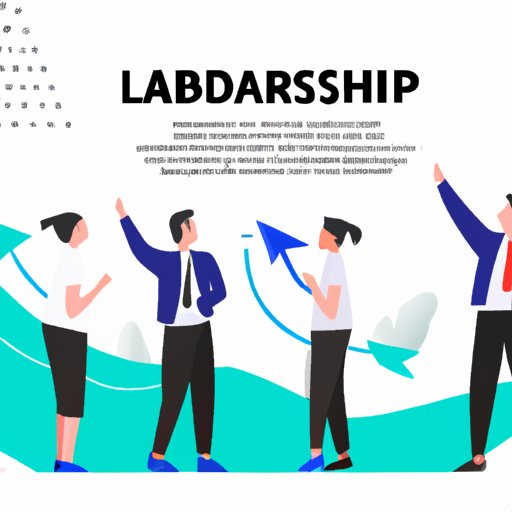
Introduction
When it comes to running a successful business, effective leadership is crucial. Organizational leadership involves guiding a group of individuals towards a common goal and creating a positive work environment where people can thrive. In this article, we’ll explore what organizational leadership is, how it impacts business outcomes, and how to develop effective leadership skills.
A Beginner’s Guide to Understanding Organizational Leadership
Organizational leadership is the practice of managing people and resources within a workplace to achieve specific goals. The history of organizational leadership dates back to the early 20th century, when scholars began studying how managers could lead employees more effectively.
There are several key principles of organizational leadership, including the ability to motivate and inspire others, to communicate clearly and effectively, to create a positive work environment, to be adaptable and flexible, and to foster collaboration and teamwork.
Organizational leadership is essential for businesses because it helps to create a culture of accountability and responsibility. When leaders empower their teams and encourage them to take ownership of their work, people are more engaged and motivated to succeed.
Effective Organizational Leadership: The Key to Business Success
Strong organizational leadership has been proven to impact business outcomes, such as increased productivity, employee engagement, and profitability. When leaders create a positive work environment where employees feel valued and empowered, they are more likely to be productive and committed to the organization’s success.
There are many successful leadership strategies that leaders can implement, including setting clear goals and expectations, providing regular feedback and recognition, encouraging collaboration and open communication, fostering a culture of innovation and creativity, and promoting work-life balance.
The Different Types of Organizational Leadership Styles and Their Impact
There are several different types of organizational leadership styles, each with its own unique impact on workplace dynamics. Autocratic leadership involves a leader making all decisions without input from others, while democratic leadership involves a leader soliciting input from others and making decisions based on group consensus.
Laissez-faire leadership allows employees to make their own decisions without much input from the leader, while transformational leadership involves inspiring and motivating employees to achieve more than they thought possible.
The impact of each leadership style can vary widely. Autocratic leadership can create a hierarchical and rigid work environment, while democratic leadership can foster collaboration and teamwork. Laissez-faire leadership can lead to a lack of direction and accountability, while transformational leadership can inspire employees to perform at their best.
Developing Organizational Leadership Skills: Tips for Aspiring Leaders
For individuals who aspire to become organizational leaders, it’s important to develop certain skills and qualities. These include strong communication skills, emotional intelligence, conflict resolution, decision-making abilities, and the ability to inspire and motivate others.
Effective leaders also know how to lead teams effectively by setting clear goals and expectations, delegating tasks appropriately, providing regular feedback and recognition, and fostering a culture of collaboration and innovation. They also know how to communicate clearly with stakeholders and inspire others to take ownership of their work.
Challenges of Organizational Leadership in the Modern Workplace
In today’s rapidly changing work environment, organizational leaders face many challenges. These can include managing remote teams, navigating a diverse workforce, adapting to new technologies and processes, and dealing with economic uncertainty.
To overcome these challenges, it’s important for leaders to stay adaptable and flexible, to prioritize clear communication and collaboration, to stay up-to-date with the latest trends and technologies, and to foster a culture of resilience and agility within their teams.
Conclusion
Organizational leadership is an essential element of running a successful business. By understanding the principles of effective leadership and developing key skills and qualities, aspiring leaders can make a positive impact on their teams and organizations. With the right strategies in place, businesses can thrive and employees can feel empowered and engaged.




